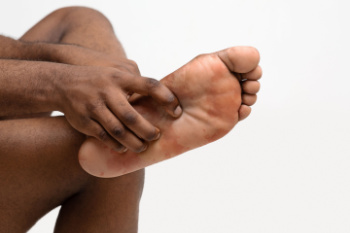
Plantar fasciitis is a common foot condition that causes pain in the heel and bottom of the foot. It occurs when the thick band of tissue along the sole of the foot, called the plantar fascia, becomes irritated or inflamed due to overuse, improper footwear, or excessive pressure. The hallmark symptom is sharp, stabbing pain in the heel, especially with the first steps in the morning, or after long periods of sitting. Treatment options include rest, stretching exercises, and anti-inflammatory medications. Wearing supportive shoes or using custom orthotics can also provide relief. In more severe cases, corticosteroid injections or even surgery may be necessary. A podiatrist can offer personalized advice, diagnose the condition, and recommend the best treatment plan. They can also help prevent future flare-ups by addressing underlying issues like improper gait or foot structure. If you are experiencing heel pain, it is suggested that you schedule an appointment with a podiatrist to get the care you need.
Plantar fasciitis is a common foot condition that is often caused by a strain injury. If you are experiencing heel pain or symptoms of plantar fasciitis, contact Dr. Michael T. Hames from Florence Foot Center. Our doctor can provide the care you need to keep you pain-free and on your feet.
What Is Plantar Fasciitis?
Plantar fasciitis is one of the most common causes of heel pain. The plantar fascia is a ligament that connects your heel to the front of your foot. When this ligament becomes inflamed, plantar fasciitis is the result. If you have plantar fasciitis you will have a stabbing pain that usually occurs with your first steps in the morning. As the day progresses and you walk around more, this pain will start to disappear, but it will return after long periods of standing or sitting.
What Causes Plantar Fasciitis?
- Excessive running
- Having high arches in your feet
- Other foot issues such as flat feet
- Pregnancy (due to the sudden weight gain)
- Being on your feet very often
There are some risk factors that may make you more likely to develop plantar fasciitis compared to others. The condition most commonly affects adults between the ages of 40 and 60. It also tends to affect people who are obese because the extra pounds result in extra stress being placed on the plantar fascia.
Prevention
- Take good care of your feet – Wear shoes that have good arch support and heel cushioning.
- Maintain a healthy weight
- If you are a runner, alternate running with other sports that won’t cause heel pain
There are a variety of treatment options available for plantar fasciitis along with the pain that accompanies it. Additionally, physical therapy is a very important component in the treatment process. It is important that you meet with your podiatrist to determine which treatment option is best for you.
If you have any questions, please feel free to contact our office located in Florence, Alabama . We offer the newest diagnostic and treatment technologies for all your foot care needs.
